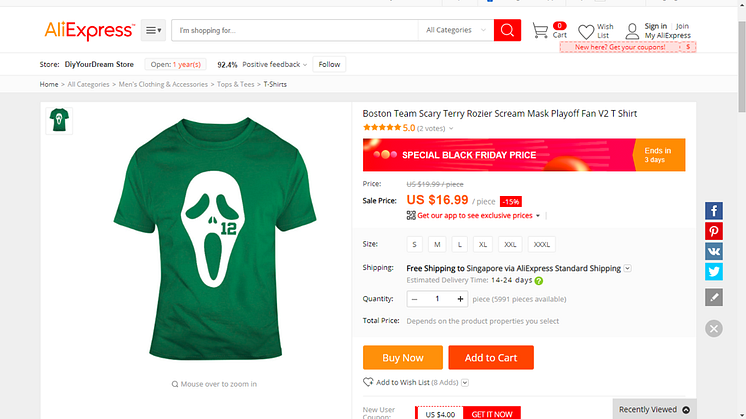
News -
Terry Rozier air balls with theft of Scream mask image
NBA star Terry Rozier has been accused of stealing the design of a mask from a movie and using it in his merchandise. Rozier, who plays for the Boston Celtics and is also known as “Scary Terry”, has been selling shirts and sweatshirts that feature his nickname and the image of the infamous mask from the 1996 movie Scream.
This has raised the ire of Easter Unlimited Inc, which does business under the name of Fun World. Rozier, who had authorised online retailers such as Barstool Sports and Teespring to sell the merchandise, has supposedly printed 500 sweatshirts and T-shirts, which sold out over two days and netted him over US$100,000.
In the court documents, Fun World said it is the original designer of the ghost face mask and owns the patent and copyright to it. The company licensed it to the movie Scream in 1996, which it said made the design of the mask widely famous and remains a popular Halloween costume mask. It said Rozier was wrong in adopting the ghost face mask design as his own mascot and pairing the design with his alter ego, “Scary Terry”. Rozier then made merchandise with images of his mascot and profited from it.
The company is demanding US$150,000 per copyright infringement, and an injunction prohibiting the NBA star from continuing to sell the Scary Terry merchandise.
Incidentally, the story behind the mask and how it came to be used in the Scream movies is one of a close brush with copyright infringement. Director Wes Craven discovered the mask, which has been sold by Fun World since 1992. Craven wanted to use it in the movie, but the movie studio Dimension Films was unwilling to license it from Fun World as the latter was asking for a high fee. Craven asked an effects company to come up with their own version of the mask, modified enough so that it would not infringe on Fun World's intellectual property. He then used the mask in the first few scenes of the movie, sending a message to Fun World that they could shoot the movie without licensing the use of the mask. This negotiation tactic brought about a lower asking fee from Fun World, and the two parties came to a licensing agreement.
There is no difference between a popular athlete stealing an image and an ordinary person doing it. But Rozier should have been better advised about his act of copyright infringement because one thing that stood out from this case is how Fun World has all the patents and trademarks related to their products. Ultimately, it will be up to the courts to decide whether Rozier has a valid defense. Creators should apply for the relevant rights and documents as these would serve them well in the last resort of bringing copyright thieves to court.
If Rozier loses the case he would have to pay over US$150,000, which would wipe out the earnings from his shirts. In the meantime, we wonder if Rozier knows about a ripoff of his design on a T-shirt being sold on AliExpress, an e-commerce website in China. Now, that would incur the wrath of both Rozier and Fun World.
